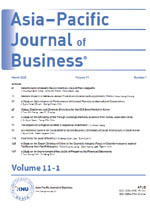- 영문명
- What Makes South Korean Perceive Happiness Lower Than Chinese and Japanese?
- 발행기관
- 강원대학교 경영경제연구소
- 저자명
- 박상준(Sang-June Park) 조예(Rui Zhao) 이영란(Yeong-Ran Lee) 박기철(Ki-Chul Park)
- 간행물 정보
- 『아태비즈니스연구』제12권 제3호, 155~173쪽, 전체 19쪽
- 주제분류
- 인문학 > 문학
- 파일형태
- 발행일자
- 2021.09.30

국문 초록
영문 초록
Purpose - Previous research points out that South Korean perceive their happiness less than Chinese and Japanese, although the three nations belong to the same Northeast Asia cultural sphere. This study aims to find out the reasons for the relatively low perception of happiness in South Korea and develop policy options to improve the relatively low perceived happiness in South Korea. Design/methodology/approach - For the analyses, analysis of variance (ANOVA) and regression analysis were performed based on the World Values Survey data (Wave 7). Findings - First, South Korean perceived happiness less than Chinese due to ‘satisfaction with the financial situation of household’ and ‘in-group trust’. More specifically, although there was no difference in the impact of ‘satisfaction with the financial situation of household’ on perceived happiness in South Korea and China, South Korean evaluated ‘satisfaction with the financial situation of household’ lower than Chinese. In addition, the impact of ‘in-group trust’ on happiness in South Korea was less than that in China, where the level of ‘in-group trust’ was also lower in South Korea than China. Second, South Korean perceived happiness less than Japanese due to ‘in-group trust’. Although South Korean had a higher level of ‘in-group trust’ than Japanese, the impact of ‘in-group trust’ on perceived happiness was less in South Korea than Japan. The contribution of ‘in-group trust’ to perceived happiness, calculated with the regression coefficient of ‘in-group trust’ multiplied by the mean of ‘in-group trust’, was evaluated lower in South Korea than Japan. Research implications or Originality This study identifies the mechanism leading to low perception of happiness in South Korea, based on the World Values Survey data.
목차
Ⅰ. Introduction
Ⅱ. 이론적 배경 및 가설설정
Ⅲ. 연구방법
Ⅳ. 실증분석 결과
Ⅴ. 결론
References
해당간행물 수록 논문
참고문헌
최근 이용한 논문
교보eBook 첫 방문을 환영 합니다!

신규가입 혜택 지급이 완료 되었습니다.
바로 사용 가능한 교보e캐시 1,000원 (유효기간 7일)
지금 바로 교보eBook의 다양한 콘텐츠를 이용해 보세요!




